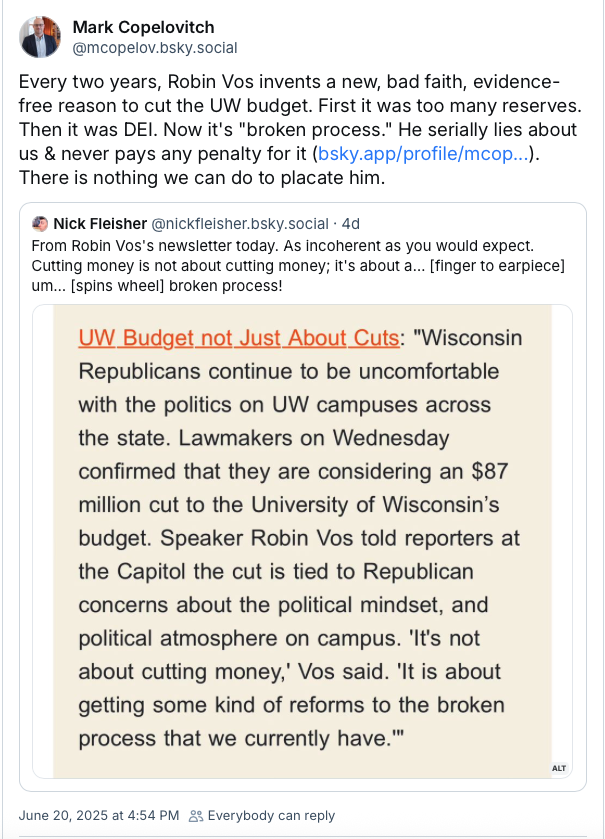Good morning.
Friday in Whitewater will be mostly cloudy with a high of 82. Sunrise is 5:18 and sunset is 8:37, for 15 hours, 19 minutes of daytime. The moon is a waxing crescent with 6.1 percent of its visible disk illuminated.
On this day in 1981, the Central Committee of the Chinese Communist Party issues its “Resolution on Certain Questions in the History of Our Party Since the Founding of the People’s Republic of China,” laying the blame for the Cultural Revolution on Mao Zedong.
There’s a nagging question that’s confronts part — but only part — of the grand coalition committed to the defense of the constitutional order: how much effort should that coalition spend trying to win over the conservative populists? For some, reaching out to that pernicious faction is an important obligation, almost a moral imperative.
For others of us, this libertarian blogger among them, there is no need, either moral or practical, for those committed to a liberal democratic order to beseech would-be authoritarians to learn what draws them to overthrow the constitutional order with a herrenvolk state. We believe, by contrast, that it is enough, morally and practically, to persuade the persuadable.
Of the practical, within Wisconsin, Bruce Murphy writes of the futility of spending time trying to win over deep red areas (when there is more to be gained in blue areas):
Yet experts continue to tell Democrats they need to make more efforts in rural areas. The latest wave of this came in reaction to an essay in the New York Times by sociologist Arlie Russell Hochschild, who has studied the people of eastern Kentucky, including a county where Trump won a whopping 81% of the vote. Her book is called Stolen Pride.
The county was a center for coal-mining, an industry that’s all but dead. These are people heavily dependent on government assistance, as are many red counties across the country, particularly in the south.
As Hothschild describes these voters it is hard to know precisely how Democrats are supposed to win them over. It is Democrats who support Medicaid and other safety net benefits, but the recipients are not happy about needing the assistance and bitter about being left behind. And so, even though Trump and Republicans want to cut those benefits, these voters support them.
Hothschild suggests Democrats shouldn’t talk down to these voters, but who exactly are these candidates stupid enough to do this? And how do you remind them you support the safety net — a key pocket book issue — without bringing up a sore subject?
Hothschild suggests Democrat need to listen to these voters. But that’s exactly what Baldwin did in the rural areas of Wisconsin. “I think showing up matters, listening matters,” Baldwin told a Fox News Digital reporter. “And so I go, and I really listen and get to know the challenges and aspirations of people.”
And for that she got 4,548 more votes than Kamala Harris.
We are fortunate that there’s a better option, as Murphy observes:
What possible answer can a Democrat offer to this? And how can they do it diplomatically and memorably in the face of Republicans who can say the nastiest things, even threaten to jail their opponents? And finally: why expend all that effort in places that don’t have that many votes?
Meanwhile America’s suburbs are becoming less red. In the last 20 years Ozaukee County has gone from 33% to 44% Democratic and Waukesha County has gone from 33% to 39% Democrat. And these are big population counties where you connect to more voters more easily. Then there are the cities, key Democratic areas where Republicans have made some inroads with minority voters. In both cases these Democrats can make their pitch a little more easily, without having to untangle the complicated pathology described by Hothschild. On a cost vs benefits basis, there is probably no area of the nation where Democrats are likely to gain less than rural America.
See Bruce Murphy, Can Democrats Win More Rural Voters?, Urban Milwaukee, June 18, 2025.
A grand coalition (of Democrats, independents, libertarians, etc.) should keep to the practical and moral goal of persuading the persuadable. It is in that way that Wisconsin, and America, will be won.
Commuter water traffic stops for whales on Australia’s humpback highway:




